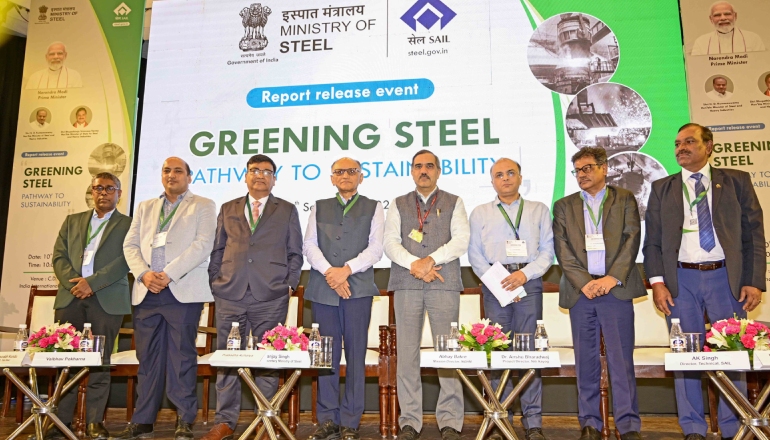The Indian steel industry received a major green boost.
The Ministry of Steel has released a roadmap and action plan to boost India’s green steel sector.
Union Minister of Steel and Heavy Industries, Mr H. D. Kumaraswamy, presented a report titled “Greening the Steel Sector in India: Roadmap and Action Plan” at the “Greening Steel: Pathway to Sustainability” event.
Ms. Neha Verma, Director, Ministry of Steel, released the report.
The report, based on recommendations from 14 task forces outlines a comprehensive plan for decarbonizing India’s steel industry. It also addresses several aspects of carbon emissions.
Key levers:
The Ministry is committed to implementing strategies and action plans outlined in the report to reduce carbon emissions. This is in line with India’s NDC commitments. The key levers of decarbonization include:
Technological innovations: Latest advancements in technology and practices that can aid in reducing emissions.
Policy frameworks: Exploring existing policies and discussion on potential policy enhancements to support decarbonization.
Future outlook: Vision for a sustainable steel industry and the role of various stakeholders in achieving these goals.
Roadmap and action plan: Strategies and interventions required from the Government as well as industry players.
The discussion board:
Former steel secretary Mr Sanjay Singh chaired a technical session on “Leadership and Innovation: Driving the Green Steel Transition.” He emphasized the importance of inventiveness and visionary leadership in sustainable steel production.
The panel comprised Dr. Anshu Bharadwaj, Project Director, Niti Aayog, Mr Abhay Bakre, Mission Director, NGHM, Mr Arvind K. Singh, Director, Technical, SAIL, Dr. Saurabh Kundu, CSO, Tata Steel, Mr Prabodha Acharya, CSO, JSW, and Mr Vaibhav Pokharna, Senior Lead, Sustainability, AM/NS India. Dhruba Purkayastha, Director, CEEW moderated the session.
Decarbonizing the steel industry:
In his introductory address, Mr Vinod K. Tripathi, Joint Secretary of the Ministry of Steel, talked about the difficulties in lowering carbon emissions.
He stressed the need to initiate decarbonization, highlighting the ongoing development of technology. He also emphasized the necessity of increasing demand for green steel in order to persuade steel manufacturers to switch to sustainable production methods.
Earlier in the day, Mr Kumaraswamy presented awards to task force chairpersons in recognition of their efforts.
He highlighted the necessity of increasing demand for green steel. He spoke about the need to persuade steel manufacturers to switch to sustainable production methods. He urged the industry to adopt multifaceted strategy of cleaner energy options, process optimization, circular economy and collaborative innovation for achieving climate goals.
Among the dignitaries were Mr Amrendu Prakash, Chairman, SAIL, and Mr N. N. Sinha, former Secretary, Steel. Both offered insightful commentary on the green transformation of the Indian steel industry.

